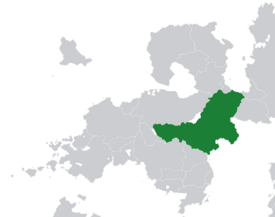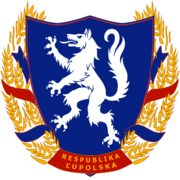User:Luepola/Vasarden archive/State of Luepola
This article is incomplete because it is pending further input from participants, or it is a work-in-progress by one author. Please comment on this article's talk page to share your input, comments and questions. Note: To contribute to this article, you may need to seek help from the author(s) of this page. |
State of Luepola Država Ľupolska | |||||||||||||
|---|---|---|---|---|---|---|---|---|---|---|---|---|---|
| 1951–1980 | |||||||||||||
|
Flag | |||||||||||||
| Capital | Prishek | ||||||||||||
| Official languages | Luepolan Vierz | ||||||||||||
| Common languages | |||||||||||||
| Government | Federal presidential republic | ||||||||||||
| President | |||||||||||||
• 1951–1962 | Christian Dobrovitch (first) | ||||||||||||
• 1980 | Emil Ivanušić (last) | ||||||||||||
| Legislature | Sliet | ||||||||||||
| Great Assembly Veliki Sbor | |||||||||||||
| Popular Assembly Ľudovi Sbor | |||||||||||||
| Historical era | Late modern period | ||||||||||||
• Krassfurt Memorandum (Formation) | 22 November 1951 | ||||||||||||
| 13 March | |||||||||||||
• Dissolution | 1 January 1980 | ||||||||||||
| Population | |||||||||||||
• 1952 | 60,574,936 | ||||||||||||
• 1979 | 75,089,374 | ||||||||||||
| Currency | Luepolan Grivna (Ғ) | ||||||||||||
| |||||||||||||
The State of Luepola (Luepolan: Država Ľupolska) was a country in eastern Patyria and the predecessor of the modern Republic of Luepola, with which its borders are contiguous. Officially a federal republic, the country was effectively a client state of the Vierz Empire, which exercised significant control in the State's domestic and foreign affairs alike. The State of Luepola was established in the Krassfurt Memorandum of 1951, ending the period of direct military rule by the Vierz Reichswehr in the aftermath of the Great War; it was dissolved in a joint resolution by the Sliet and President Emil Ivanušić on 1 January 1981, during the Luepolan War. The period during which Luepola was under Vierz control has been labelled the Silent Era (Mlčavši Rok), referring to both the Silent War over which the State spanned, and to the perceived repression of Luepolan sovereignty and national consciousness.


